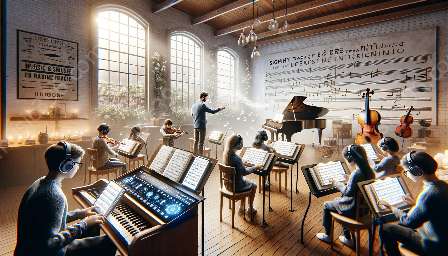Engaging young children in piano lessons is a critical aspect of effective piano pedagogy and music education. This comprehensive guide aims to help parents and teachers create an appealing and genuine way to engage children in learning the piano.
The Importance of Engaging Young Children in Piano Lessons
Learning to play the piano at a young age can have numerous benefits for a child's cognitive, emotional, and social development. Engaging young children in piano lessons is crucial for fostering a lifelong love of music and providing them with a solid foundation in music education.
Understanding Piano Pedagogy
Piano pedagogy encompasses the methods and techniques used to teach piano playing. When engaging young children in piano lessons, it's essential to consider the principles of piano pedagogy to ensure that the learning process is effective, engaging, and age-appropriate.
The Role of Music Education
Music education plays a vital role in shaping children's understanding of music and helping them develop essential musical skills. When engaging young children in piano lessons, incorporating elements of music education can enhance their overall learning experience and foster a deeper appreciation for music.
Creating an Attractive Learning Environment
Engaging young children in piano lessons requires creating an attractive learning environment that stimulates their interest and encourages their active participation. This can be achieved through the use of colorful and engaging teaching materials, interactive learning activities, and a supportive and nurturing teaching approach.
Effective Teaching Strategies
Utilizing effective teaching strategies is crucial when engaging young children in piano lessons. This includes incorporating interactive games, storytelling, and creative play to make the learning experience enjoyable and engaging for the children. Additionally, employing positive reinforcement and praise can help motivate young learners and build their confidence.
Parental Involvement and Support
Parents play a significant role in supporting and encouraging their children's piano learning journey. Engaging parents in the process can enhance the child's learning experience, as well as strengthen the bond between the child, the teacher, and the parents. Providing resources and guidance to parents on how to actively support their child's piano lessons can boost the child's overall progress and enthusiasm for learning.
Adapting to Individual Learning Styles
Every child has a unique learning style, and it's essential to adapt teaching methods to cater to individual needs. Engaging young children in piano lessons involves recognizing and accommodating different learning styles, whether visual, auditory, kinesthetic, or a combination of these. By tailoring the lessons to suit the child's learning preferences, the learning process becomes more engaging and effective.
Integrating Technology and Innovation
Embracing technology and innovation in piano pedagogy can make the learning experience more engaging and dynamic for young children. Incorporating interactive apps, digital resources, and multimedia tools can capture the children's interest and provide them with additional avenues for learning and exploration.
Nurturing a Love for Music
Ultimately, engaging young children in piano lessons is about nurturing a genuine love for music. Creating a positive and nurturing musical environment where children can explore, express themselves, and develop a deep appreciation for music is key to their long-term engagement and success as pianists.















